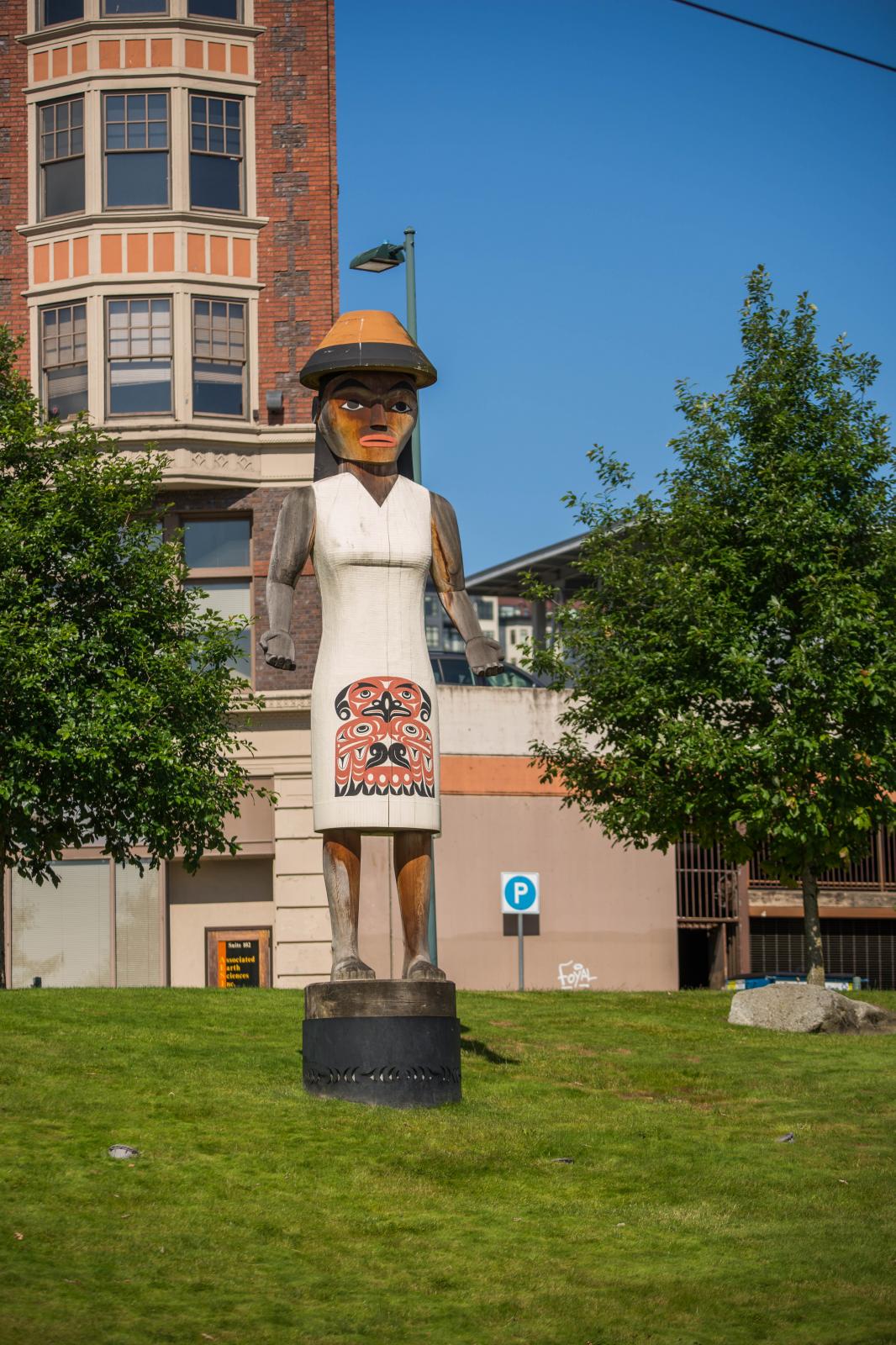
According to Puyallup historians, Native American travelers knew the tough part of their journey lay behind them when they were greeted by a welcome figure like this on the shores of Puget Sound. Carved by Qwalsius (Shaun Peterson), in a style unique to the Puyallup People, spuyaləpabš Welcome Figure is a modern take on a local traditional art form.
The style of Welcome Figure is traditional to this region and the Coast Salish tribes. Totem poles are often mistakenly identified with the Pacific Northwest, but that form was primarily practiced by the First Nations Groups of Canada and Alaska. Traditional wood carving practices of the Puyallup included welcome figures.
In the words of the artist, the colors and formlines of this piece were chosen with intention and purpose:
"The earth red color here signifies the healing power associated with Thunderbird by the Puyallup people long ago. Although it was believed that Thunderbird had white feathers, the print and the painted dress pattern convey a healing that is called upon for the devastation of losing a prominent village. Contrary to surrounding tribes who envision the Thunderbird as a massive creature who consumes whales, the Puyallup percieved the being to be no larger than a small hawk. It is an indication that power was not associated with mass and that the strength to heal was of equal if not greater importance in the philosophy of our ancestors."
Many Puget Sound tribes continue to practice the important practices that distinguish this region of the world, generously sharing their culture through art, song, and dance. The intention of this contemporary welcoming figure is the same as that of its predecessors: with its arms outstretched, it gracefully receives visitors to the site while powerfully honoring the traditions of the area’s first peoples.
Generous and blessed with abundant resources, the Puyallup often hosted Native travelers. Their generosity extended to non-Native newcomers as well, though their gestures of friendship were not always reciprocal.
The tribes of the Pacific Northwest were connected through travel, marriage, and a practice called potlatch. A potlatch is a gift-giving feast meant to mark an important event. At the end of the party, the host family gave away all their worldly possessions. Ample resources and a culture of generosity made it easy for hosts regain what was “lost” after they hosted a potlatch.
From the site of Welcome Figure, visitors can glimpse the Tacoma Dome, and on clear days, Tacopid (Mt. Rainier). Tacopid supports its caretakers with water, fish, timber, and game. It is a beloved source of life for the Puyallup. Historically, the Tribe tucked villages and temporary hunting camps into the gentle curves of the streams and rivers that flowed from the mountain. But their main village sat where the Tacoma Dome now stands. What little remains of that village lies beneath forty feet of fill today.
Today, tribal headquarters are located off of Portland Avenue, in East Tacoma, where the tribe owns many local businesses, provides services to tribal members, and offers education about the tribe's historic and contemporary cultural practices and lifeways.
Qwalsius (Shaun Peterson) is a prolific Puyallup artist and a towering presence in the movement to revive Coast Salish Art traditions. He carved Welcome Figure in 2010. Qwalsius works in many art forms, from carving, to painting, to printing — always inspired by his heritage. His pieces mix tradition with innovation. His works have graced exhibitions in New Zealand, China, Japan, and throughout the U.S., and permanently adorn several buildings on the Puyallup Reservation. He is currently working on a large commission for the Seattle waterfront.
Got a personal connection, story, or inspirational comment you'd like to share about what you've experienced on the Prairie Line Trail? Here's your chance to make your story part of history.
Planning & Development Services
Tacoma Municipal Building
747 Market Street | Tacoma, WA 98402
(253) 591-5000
People with hearing or speech impairments may contact us through Washington Relay Services (800) 833-6388 (TTY or ASCII) (800) 833-6386 (VCO) or (877) 833-6341 (STS).